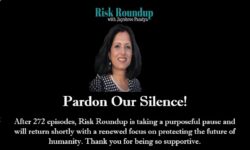Prof. Wulf Kaal, Co-Founder, and CEO of Semada.io, Prof. of Law at University of St. Thomas School of Law, a leading expert at the intersection of law, business, and technology focusing on innovation, technology, emerging technology applications, smart contracts, initial coin offerings, hedge funds, and dynamic regulatory methods based in the United States participate in Risk Roundup to discuss CryptoEconomics.
CryptoEconomics
As we see across nations today, most organizations are centralized; whereas, markets, in general, are decentralized. Now, when blockchains coupled with token incentive systems facilitate decentralization and takes a step towards being a global computer network to bring nations a new crypto-economic world order; they are slowly but steadily emerging as a strong competitor to traditional organizations and markets.
From smart contracts to decentralized autonomous organizations (DAOs), the framework for creating and executing the types of rule systems that enable socio-economic coordination is already in the process of being defined and designed. As a result, anything that is being built on the evolving blockchain platform today, and incoming tomorrow, will likely have a global reach without any barriers to boundaries in cyberspace, geospace, or space. So, as blockchain technology triggered move– from a centralized system approach to a decentralized one– begins to re-define and re-design the entire cryptography economy from scratch, it is important to understand why we are moving away from centralization towards a decentralized crypto-economy, where it will take us, and whether we are prepared for what is to come.
This is especially important, because, designing any new economic system from scratch is a very complex undertaking.–and crypto-economy is no different This is particularly very complex as we move towards a decentralized approach from a centralized one—and human behavior, interactions, emotions, power play, and politics will likely play a key role in the crypto-economy we are trying to build. It is therefore important to understand and evaluate whether we know what we want with the new crypto-economic system we are trying to build, and whether blockchain technology will truly let us define and design systems to help bring the world together beyond our divisions and differences for the future of humanity.
This necessitates that we define effective standards, processes, framework, strategies, rules, and governance mechanisms for interactions of the evolving decentralized crypto-economic system that can work for everyone across nations –because if rules are not correctly defined, a decentralized crypto-economic system is bound to collapse and fail—triggering complex security risks for which no nation is prepared for. Time is now to understand and evaluate security risks emerging from CryptoEconomics!
For more please watch the Risk Roundup Webcast or hear the Risk Roundup Podcast
About the Guest
Prof. Wulf Kaal is a leading expert at the intersection of law, business, and technology. His research focuses on innovation, technology, emerging technology applications, smart contracts, initial coin offerings, hedge funds, and dynamic regulatory methods. Before entering the academy, he was associated with Cravath, Swain & Moore LLP, in New York, and Goldman Sachs in London, UK.
Kaal advises medium to large enterprises, crypto startups, venture capital funds, and international policy makers on emerging technology solutions. As an adviser and mentor, Kaal focuses on creating synergies for his clients and building successful new businesses, among others, on existing solutions. Professor Kaal speaks regularly at leading conferences in the United States, Europe, and Asia.
His speaking engagements include presentations at the European Central Bank, Harvard University, Columbia University, University of Chicago, UCLA, George Washington University, Northwestern University, Emory University, and the University of Notre Dame, Bocconi University, and Tilburg University, among many others. Kaal teaches Disruptive Innovation, Coding for Lawyers, Dynamic Regulation, Private Investment Funds, Federal Securities Regulation, Corporate Law, International Finance, and European Union Law at the University of St. Thomas School of Law in downtown Minneapolis. He has previously taught at the University of Minnesota Law School, Humboldt University in Berlin Germany, European Business School in Wiesbaden Germany, and Tilburg University Law School in the Netherlands.
Kaal is a leading expert and the most widely published proponent of blockchain innovation in law and corporate governance as well as dynamic regulation and associated regulatory applications to improve and expand innovation, including through blockchain technology and smart contracting. His empirical and theoretical scholarship in this context evaluates the evolution of law, regulation of disruptive innovation, the diminishing capacities of the regulatory infrastructure, the role of governmental contracts, the dynamic regulatory approaches for the financial services, the diminishing relationship between regulation and innovation, and the so-called ‘pacing problem’ between innovation and regulation, among many others issues. Possible dynamic regulatory mechanisms evaluated in Professor Kaal’s scholarship on dynamic regulation include blockchain technology, big data, contingent capital securities, governmental contracts, venture capitalist investment allocation, and crowdfunding. Kaal is also a leading expert on private investment fund regulation and compliance and private investment fund innovation in finance. His scholarship constitutes over 85% of the empirical and theoretical scholarship on private fund regulation in the United States. Using hand-selected and commercial databases that have industry-wide applications, Professor Kaal applies empirical methods to investigate the effects of financial regulation across a wide spectrum of regulatory issues. His theoretical research focuses on the use of finance and economic theory to analyze and inform financial and regulatory policy. Kaal’s study on the effects of hedge fund registration requirements under Title IV of the Dodd-Frank Act has gained national attention and was covered in a Business Week article and other journals.
As a consultant, Kaal assists clients with blockchain-based projects including initial coin offerings. He regularly advises major corporations and private funds regarding various aspects of financial markets. He also assists law firms in complex litigation involving private investment funds and alternative investments. Expert witness and consulting engagements within Kaal’s area of expertise include corporate law, federal securities regulation, fiduciary duties, voting requirements, conduct and duties of the board of directors, insider trading, duties and obligations of broker-dealers and investment advisers, SEC oversight of investment advisers, compliance of private investment funds, among others. He is also a FINRA arbitrator.
About the Host of Risk Roundup
Jayshree Pandya (née Bhatt), Founder and CEO of Risk Group LLC, is a scientist, a visionary, an expert in disruptive technologies, and a globally recognized thought leader and influencer. She is actively engaged in driving global discussions on existing and emerging technologies, technology transformation, and national preparedness.
Her work focuses on the impact of existing and emerging technological innovations on nations, national preparedness, and the very survival, security, and sustainability of humanity. She believes that the reality of the imminent technological and economic singularity necessitates that Darwin’s evolution theory, a theory that has evolved from natural selection to the survival of the fittest to symbiosis to mutualism be translated and scaled from micro to macro level and understood and evaluated from the perspective of the transformative and evolutionary changes seen across nations (largely triggered due to technology transformation and re-defining and re-designing of systems at all levels). Her research in this context evaluates the evolution of intelligence in all forms, researches strategic security risks emerging from disruptive innovations, reviews the diminishing capacities of the risk management infrastructure, points out the changing role of decision-makers, defines dynamic decision-making approaches with machine intelligence, integrates all components of a nation: governments, industries, organizations and academia (NGIOA), and defines strategic security risks so that nations can improve the state of risk-resilience across cyberspace, geospace and space (CGS). As nations make a move from centralization towards decentralization, the re-defining and re-designing of systems at all levels evaluated in Dr. Pandya’s comprehensive research scholarship include artificial intelligence, machine learning, deep learning, internet of things, blockchain, cryptocurrency, quantum computing, virtual reality, synthetic biology, big data analytics, drones, nanosatellites, biotechnology, nanotechnology, gene editing, and much more. Her research is much needed for the survival and security of humanity today and in the coming tomorrow.
Jayshree’s doctorate work in the 1980s focused on hydrogen production by Halobacterium halobium, for which she received India’s National Young Scientist Award in Biochemistry. Her many publications on this work have been cited in several books, journals, and reports published by governments, including a report from the United States Department of Energy. Her work on anti-cancer drugs also received worldwide attention and, amongst other citations, has been referenced in a report published by the World Health Organization. In 1991, she was invited to come to the United States (under the Scientist Exchange Program) to continue research on hydrogen production and was awarded a post-doctoral fellowship at the Hawaii Natural Energy Institute. After that, she researched atherosclerosis at the University of Chicago Medical School. Next, she took a job at Aurotech, a biotech company based in Wisconsin. As in her Ph.D. research, she used microorganisms to develop natural processes and technologies, and some of the projects she worked on were quite promising. While her doctorate and post-doctorate studies gave her the first taste of the power of interdisciplinary research, it also introduced her to the repressive power of institutional silos and inefficiencies. As a result, her physical location wasn’t the only thing that shifted in the 1990s; her focus did as well. Since Microbiology trained her to see changes in tiny organisms coming from natural selection, she began to see similar forces at work in the evolution of individuals as well as entities across NGIOA and society in general. It’s all the same basic mechanism. Her career took another turn after she was asked to consider risk management as part of a strategic planning effort by one of her employers. She quickly realized that most risk management is all process, with no actual benefit. That was the beginning of Risk Group, the strategic security risk research organization she founded in 2002, from where she is passionately creating and managing cutting-edge security ventures that bring a futurist perspective to nations and all its components to improve innovation capacity and to define and design new ideas, innovations, products, and services for security and sustainability.
From the National Science Foundation to organizations from across nations, Jayshree is an invited speaker on emerging technologies, technology transformation, digital disruption, strategic security risks, industry risks, and country risks. She is the author of the book, The Global Age: NGIOA @ Risk and has also published many scientific and technical papers.
Jayshree advises decision-makers at all levels on existing and emerging technologies: emerging applications, impact, and solutions.
About Risk Roundup
Risk Roundup, a global initiative launched by Risk Group, is a security risk reporting for risks emerging from existing and emerging technologies, technology convergence, and transformation happening across cyberspace, geospace, and space. Risk Roundup is released in both audio (Podcast) and video (Webcast) format and is available for subscription at (Risk Group Website, iTunes, Google Play, Stitcher Radio, Android, and Risk Group Professional Social Media).
About Risk Group
Risk Group LLC, a leading strategic security risk research and reporting organization, is a private organization committed to improving the state of risk-resilience through collective participation, and reporting of cyber-security, geo-security, and space-security risks in the spirit of global peace through risk management. Incorporated as a limited liability corporation and headquartered in Sugar land TX, Risk Group is independent, impartial, and not tied to any interests. Best known for its Risk Roundup initiative, Risk Group publishes benchmark Risk Roundup Webcast and Podcast reports on Artificial Intelligence, Machine Learning, Deep Learning, Internet of Things, Blockchain, Cryptocurrency, Quantum Computing, Virtual Reality, Synthetic Biology, Big Data, Drones, Nanosatellites, Cyber-Security, Geo-Security, Space-Security, Cyber Warfare, Electronic Warfare, Dual-Use Technologies. Risk, Risk Management, Resilience, Wearables, Technology Trends, Strategic Security, Futurism, and much more. The rapidly growing Risk Roundup Community is a beacon of hope for the future of humanity.
Copyright Risk Group LLC. All Rights Reserved





 The Rise of Algorithms in Decision-Making
The Rise of Algorithms in Decision-Making